- Home
- Kim Newman
An English Ghost Story Page 3
An English Ghost Story Read online
Page 3
Then, when even the nice ghosts were ignoring her, Weezie felt in her bones an icy shudder. The Gloomy Ghost’s chuckle. He could only be happy if she was not. When she was unhappy she leaked tears and screwed up her face until she became what Papa called ‘a Sneezy Weezie’. She hated to be called ‘a Sneezy Weezie’ more than she hated spinach and wasps, which were the worst things in the world. The only thing she hated more was her horrid, horrid real name.
The only times the Gloomy Ghost laughed out loud was when someone called Weezie ‘a Sneezy Weezie’. At those times, it was all Weezie could do not to blub like a baby.
All the ghosts had special places in Hilltop Heights, like Club’s cave or Goodie and Crispin’s herb garden. The Gloomy Ghost’s special place was a sad copse down by a stagnant stream. When not making mischief for Weezie, the Gloomy Ghost lay on the rocks like a pool of black slime or hovered low about stunted roots like a thick mist. More than anything, he liked it when Weezie got some of him on her blue pinafore and she had to wear something else until it was laundered.
Once, as a glorious summer morning was dawning and the ghosts were calling to Weezie to play outside in the sunshine, black ink was spilled over Papa’s ledgers and trailed across Mama’s best carpet by Weezie’s shoes. It was useless to protest that she had not been wearing the shoes, had in fact outgrown them months ago. There was blame to be had and she would have to take it.
In her room, jailed for a whole day, she was a Sneezy Weezie. There was nothing else for it.
Why was the Gloomy Ghost so gloomy?
None of the others could tell her. He just was what he was.
She wished now that the ghosts had been nicer to the psychical investigator. He might have been able to tell her what to do about the Gloomy Ghost.
When finally let out of her room for supper, which she was to take today without dessert as a punishment, she was determined to sort the Gloomy Ghost out.
Things could not go on like this.
After supper, when it was almost dark and the summer day was gone for ever, she went out to the Gloomy Ghost’s copse and stood over his black pool of slime.
‘Why are you so horrid to me?’ she asked, out loud. ‘I’ve never hurt you, and nor has anyone else.’
The black pool rippled.
She thought the Gloomy Ghost was laughing and stamped her foot. A loose stone splashed into the pool.
Suddenly, she felt awful inside.
The Gloomy Ghost was not laughing. He was crying, harder than she had in her room.
She forgot that she was very angry.
For the first time, between sobs, the ghost spoke.
‘You gave me your toothache,’ he said. ‘And that hideous multiplication table. Ghosts feel only what people near them feel. Whenever I came near you, you felt only nasty things. Seven times seven.’
She was surprised. She had not understood.
‘And why do you call me Gloomy? I don’t like it at all. No more than you like to be called Sneezy or…’
He used her real name, her horrid name. Hearing it was like a slap.
Weezie’s heart ached. She thought back and couldn’t remember when the Gloomy Ghost started to be gloomy. It seemed to be ever since she had known of him. But, she realised, she had been the one who gave him his name. The others had picked it up from her.
To him, it was as bad as her real name was to her. He hadn’t chosen it and he hated it. If he was called Gloomy, he became gloomy. Worse than gloomy, cruel and mean. But, underneath, he wasn’t like that. He wasn’t like anything. He was a ghost.
She wanted to comfort him.
‘There, there,’ she said, letting her hand lie close to the pool but not touching the slime. ‘What would you like to be called?’
‘I… I don’t know. I’ve forgotten my name.’
‘Poor thing.’
A tear leaked from her eye and dropped into the pool. Where it fell, the black became clear as water but thinner than liquid, like pure light.
‘I think I’d like to be called Merry,’ said the Gloomy Ghost.
‘The Merry Ghost?’
The pool rippled. Some slime accidentally got on Weezie’s hand and before she could think not to she had wiped it on her pinafore, leaving a black streak. She frowned, but made herself not get angry.
The streak faded to nothing.
The black pool rose up and became white, taking shape.
The Merry Ghost was a little boy, younger than Weezie but about her height. She could see through him, but he had a definite form. He was smiling but his eyes had no practice at not looking sad so they gave him away.
Her tear coursed through him, through the ghost-stuff of his body, until it touched his phantom heart.
He smiled and reached out to hug Weezie.
His arms were clean but cold, and she shivered in his hug. It was a comforting shiver, a happy chill descending after a hot, stuffy day indoors.
From then on, the ghost was no longer gloomy.
Until she went away to school, Weezie was best friends with the Merry Ghost and Hilltop Heights was the happiest of haunted houses.
They had many other adventures, and perhaps you’ll hear about some of them one day.
* finis *
Moving Day
Sun rose over the Hollow. Birds sang, and flew from the trees to the eaves of the house. Water boatmen skipped on the duckweed in the ditches. Early summer dew burned off in a trice. Apples, ripe early, hung in the orchard, ready to be eaten.
The Hollow was coming to life, in anticipation.
* * *
Brian Bowker drove Steven out to the Hollow and handed over the keys, along with an oilskin packet of papers and deeds. Steven shook hands with the estate agent, who lingered an awkward moment – not setting foot on property no longer under his custodianship, his right of access given away with the keys – and left, wishing the Naremores joy in their new home.
Steven opened the gate and let it swing inwards on its new hinges, then crossed the bridge. He found himself striding proudly up the drive, until he stood between the shadows of the towers. He got on his mobile and told Kirsty they owned the Hollow. She said the movers had called and were on their way from London.
After ringing off, he wandered beyond the house and stood alone in his orchard, looking at his trees and his house, feeling the spring of his grass under his soles. At last, he could relax. For the first time in what must have been years, he was completely calm, secure, safe.
His wife and kids were back in Sutton Mallet, at the B&B where they’d spent the night. The family’s belongings were in a removal van on a motorway. Steven’s business was out in the aether: telephone numbers, e-mail addresses, websites, domain names and bank accounts in the process of transfer from one physical address to another. This moment of possession was his alone.
On behalf of the family, but his.
There had been a bad moment when the survey came back with a list of needed repairs, but the Teazle estate had dropped the asking price. In his profession, Bowker could almost pass for human. He’d gone out of his way to fix the deal, arranging for the urgent work to be done before exchange of contracts. Steven’s ambition, however, was still never to be in a kitchen with an estate agent again.
Since that first visit to the Hollow, he’d been back several times, frustratingly chaperoned, suffering agonies of doubt. What had been obvious that first time was hard to recapture. He should not have worried. He knew that now.
Experience led him to expect disappointment, to suspect a fast one being pulled. The hardest part was overcoming his instinct to distrust. He had to concede the possibility something good was being gifted.
It was still here. What they had all felt.
He looked up at the West Tower, at the window of the room he would share with Kirsty. In the flat – in the old flat – their double bed had to be jammed into a corner, leaving only a thin L of path around it. To get dressed or undressed without banging elbows or knees
, they’d had to go into the bathroom. The master bedroom at the Hollow had space for a king-size bed, a dressing table, a full-length mirror and matching his-and-hers chests of drawers with room left over. Should they ever want to, they could fit in a hip-bath, a spinning wheel, a Nautilus machine and a pinball table. The walk-in wardrobe was the size of Tim’s old room.
The window caught the sun and flashed like a mirror held by a partisan signalling an all-clear to comrades.
Because he could, because no one could stop him, Steven let his body go limp and fell to his knees, feeling the cool of the grass through his jeans, then pitched forward onto his face and rolled over to look up at the sky.
He lay on the land he owned. Tree branches crowded his vision. Green and gold fruit hung, waiting to be plucked and eaten. They must all have apples. It would be a ceremony. Eating the fruit would seal the pact.
His mobile trilled. He let it ring for long seconds.
Overarching branches shielded him from the sun. He did not have to squint or blink. He could focus on the gentle movements of the trees. They had been beckoning; now they were welcoming.
Steven felt as if he were being hugged.
* * *
Jordan kept an eye on the road ahead. It wasn’t a winding country lane but an arrow-straight Roman causeway across a moor. It would be all too easy to drive into a ditch if the road took a sharp, unexpected kink. Mum, car phone wedged between shoulder and jaw, ran over her things-to-do-list, talking equally to Dad over the phone and Jordan and Tim in the car.
Mum was sensitive about her driving – she’d been in two accidents, and once lost her licence for a year – so Jordan didn’t mention any minor veering or the incident of the startled cyclists. She would only speak up if a Naremore life was threatened. Tim had a dent in his forehead, near the hairline, from the worse of the two crashes. He was always careful to fasten his seat belt now, even when sitting in a parked car. Jordan had been in the accident too, but only sustained minor bruises. She remembered the instant of grinding terror, though.
Jordan saw Mum had spotted the turn-off. They had their own signpost: THE HOLLOW ½M. On large-scale maps, the place was listed as if it were a tiny village separate from the already-tiny-enough Sutton Mallet.
The signpost was a pick-up point for the school buses she and Tim would be catching come September. Because of a discrepancy in the educational systems of town and country, it was easier to let them miss a month or so at the end of this academic year and start fresh in the autumn, after an extended holiday which stretched ahead like an eternity. Tim would be joining Class Six of primary school in Huish Episcopi. She would be in the second year at Sedgwater College.
Her old college let her sit her mocks a month early, to help with the move. She had done as well as expected. Exams had never been among her problems. That was one of the reasons few noticed the problems she did have: as long as she got marks in school, all must be right at home and in her heart.
There was no point thinking like that. Things were different now.
She could hardly believe it herself, but last night in the cramped B&B room, even before they were in the Hollow, she had breathed easier and slept well. Weights which had pressed down on her for as long as she could remember were lifted. She wanted to call Rick as soon as possible, and tell him how she felt, how things were changing. Without Rick, she might not have made it through the dark forest to this clearing.
Mum’s list ran on as she drove along the turn-off that became the drive of the Hollow. At this rate, her parents would still be on the phone to each other when they were face to face.
‘Nearly there, Steven,’ said Mum. ‘I’ll click off.’
She put the car phone in its dashboard cradle, and checked on Jordan and Tim with glances up at the rear-view mirror and to the side.
‘You two have everything sorted? We’ve a lot to get through today.’
Getting the major moving-in done in one day was important to Mum and Dad. They wanted to sleep soundly in their new house and wake up the next morning to find themselves at home.
For Jordan, it would be different. It would take months of exploring and teasing and rearranging and experimenting before she was settled. It would be like when she started going out with Rick, and wasn’t quite sure what to make of him but knew it would be all right in the end. She looked forward to the long business of moving-in. It would be an adventure, just as Rick had been – was still – an adventure.
‘Your LL has been noted and processed, ma’am,’ said Tim.
‘LL?’ queried Mum.
‘Lengthy List,’ Jordan explained.
Tim’s acronyms often annoyed Mum, but now she laughed, half-turned and accepted her son’s salute.
Tim wore baggy camouflage trousers, a green-black T-shirt and an SAS-style black beret. For this mission, he had tiger-striped his face grey and green and gold.
Jordan sometimes thought her little brother inhabited one of those weird zones. Then again, she was hardly one to speak up. None of the Ne’er-do-well Naremores could stand for the Average Normal Party.
‘Where’s he got to?’ Mum asked.
They were driving through the gate, over the bridge – less rickety-rackety after the concrete fix-up required by what Tim called the SS, Sinister Survey – and onto (into?) the Hollow. Mum looked around for Dad.
They had agreed, in a way Jordan thought was sweet, that he should not go into the house – their house – without them. The family should take the first step inside together.
Dad should be outside.
‘You could always give him a bell,’ Jordan suggested.
Mum instinctively reached for the car phone before realising it was a joke.
‘HH,’ she said, exaggeratedly. Standing for ‘ha-ha’, it was a Timism the whole family had picked up on.
‘Is Dad a casualty?’ Tim asked.
Jordan and Mum looked where Tim was pointing, between the garage and the house. Dad was lying flat on the ground in the orchard, limbs stretched out in an X. Hearing the car, he sat up sharply, flyaway hair sticking out, displaying a goofy grin.
‘Definitely a casualty,’ Mum confirmed.
* * *
It was a day of firsts and rituals. That was important. They linked arms and octopus-stepped over the threshold, cramming themselves into the foyer. Then they laughed as Steven searched his pockets for the keys which he had only just put away, refusing to let his arms free until they were properly inside. He had forgotten the inner foyer doors, which led into what Tim called ‘the secret passage’. All the doors and windows were newly fitted with locks. The keys were still shiny and hard to tell apart, but he instinctively slid the right one into the lock and it turned easily.
Kirsty and Jordan set out to make a ceremonial pot of tea. There were cups a-plenty in the kitchen, though they had to be rinsed of months’ dust. Kirsty had brought tea-bags and milk from the village shop. While the womenfolk saw to their chores, Steven and Tim went out to fetch apples.
‘The golden ones are sweet and for eating, while the green ones are tart and for cooking,’ said Kirsty.
‘You should get the gold ones,’ added Jordan.
‘HH,’ said Steven and Tim, together.
In the orchard, Steven put on an ironic caveman voice and told his son, ‘Men hunt, women cook.’
‘Women can hunt,’ said Tim.
‘Absolutely, Timmy.’
Steven hefted Tim, who was getting to be quite a weight at ten up onto his shoulders and hoisted him towards an apple-bearing branch.
‘I can’t reach, PP.’
PP. Paternal Parent.
‘I can’t heft you any higher.’
‘It’s all right.’
Apples fell past Steven and thumped on the grass. Four exactly.
‘The branch bent. I couldn’t reach it, but it could reach me.’
‘If that isn’t a welcome, I don’t know what is.’
He crouched and let Tim vault off his shoulder
s. Straightening up, he saw the branch still swaying, having given up its gifts. Tim snapped off a salute to the tree, which Steven solemnly echoed.
Tim pulled the front of his T-shirt out into an apron-pocket and piled in the apples. His white tummy and arms undermined his junior commando look, made him less Tim o’ the Green.
This could work, Steven thought. No, he must be more positive. This would work.
The past two months had been eerily quiet. At first, he felt he was walking through a landscape dotted with unexploded bombs, some sticking obviously out of the dirt, others buried just below the surface. An explosion would almost have been a relief. At least, a big bang would mean things getting back to what passed for normal. Then it dawned on him. A tiny green shoot of an idea, poking up through the blasted landscape. Could this be hope? Had everything really changed?
The family had made an unspoken pact. Their mission, as Tim would have put it, was to get back to the Hollow, to occupy the position and to hold off all-comers. With that end in view, sacrifices Steven had expected to be forced after screaming matches were made with quiet dignity. It was not just about Dad being a crackpot.
Before they saw the Hollow, the mooted move had been an act of desperation, a last chance. It had been this or call in the lawyers, the therapists and – God help him but it might have come to it – the hit men. Since their first sight of this place, he had begun to feel they were not escaping from anything but escaping to something.
Now they were here, safe.
* * *
While the removal men carried family belongings into the house, Tim executed a complete reconnoitre of the territory. With two cups of tea in him, he piddled in all four of the toilets, achieving a satisfactory FF (First Flush) in each. He had enough pee left to spray a few drops into the ditch at the far border of the property. Holes plopped in a green mass of duckweed, took slow moments to fill in. In the city, only the homeless piddled in the open air, but the country welcomed the watering.
That first time, Tim had carried out only the most perfunctory reconnaissance. Mum and Dad had been back to the Hollow while prepping the relocation. The BS had gone along on one of those expeditions, but he was held in reserve, confined to quarters. This was the key deployment. It was on him now. He had to get the lie of the land, assess its potential. Once mapped and known, landscape was an ally.

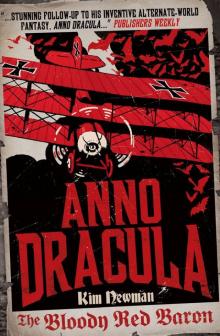 The Bloody Red Baron
The Bloody Red Baron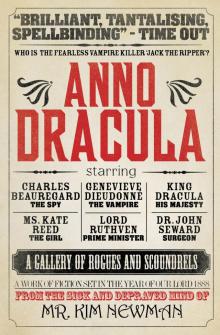 Anno Dracula
Anno Dracula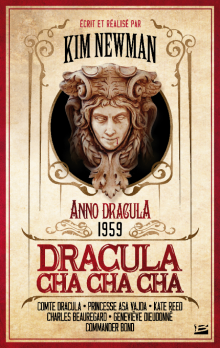 Dracula Cha Cha Cha
Dracula Cha Cha Cha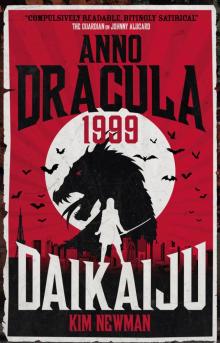 Anno Dracula 1999
Anno Dracula 1999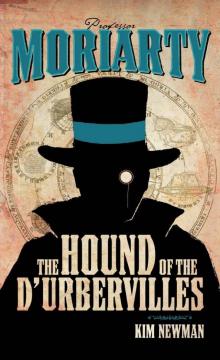 Moriarty: The Hound of the D'Urbervilles
Moriarty: The Hound of the D'Urbervilles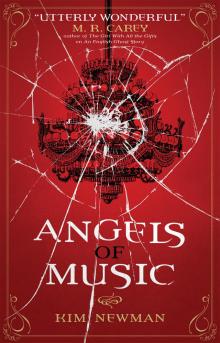 Angels of Music
Angels of Music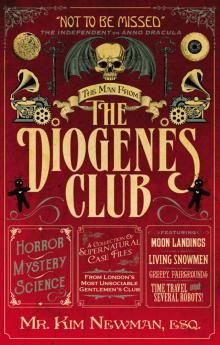 The Man From the Diogenes Club
The Man From the Diogenes Club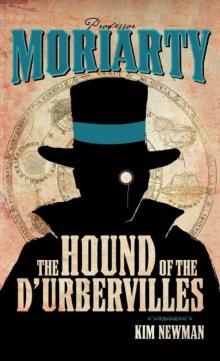 Professor Moriarty: The Hound Of The D’urbervilles
Professor Moriarty: The Hound Of The D’urbervilles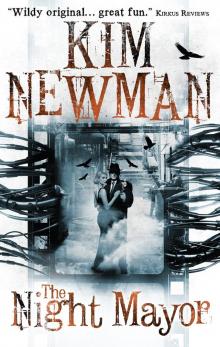 The Night Mayor
The Night Mayor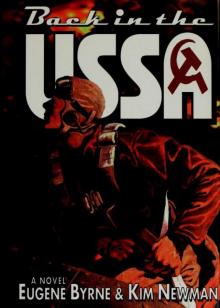 Back in the USSA
Back in the USSA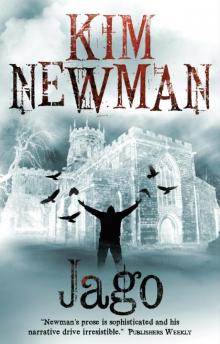 Jago
Jago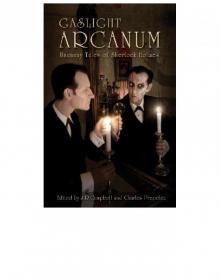 Gaslight Arcanum: Uncanny Tales of Sherlock Holmes
Gaslight Arcanum: Uncanny Tales of Sherlock Holmes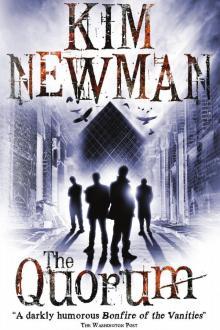 The Quorum
The Quorum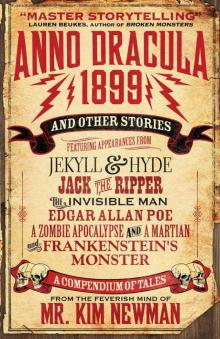 Anno Dracula 1899 and Other Stories
Anno Dracula 1899 and Other Stories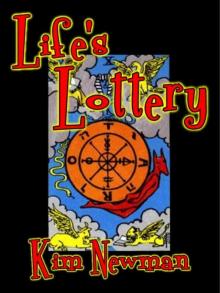 Life's Lottery
Life's Lottery The Secrets of Drearcliff Grange School
The Secrets of Drearcliff Grange School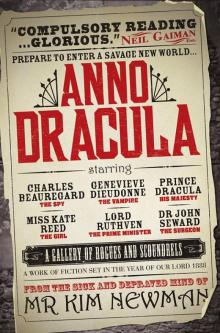 Anno Dracula ad-1
Anno Dracula ad-1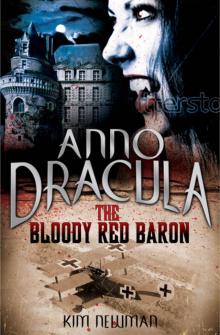 The Bloody Red Baron: 1918 ad-2
The Bloody Red Baron: 1918 ad-2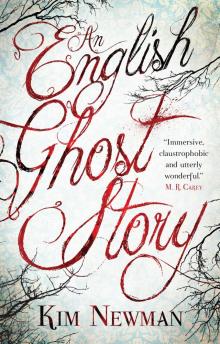 An English Ghost Story
An English Ghost Story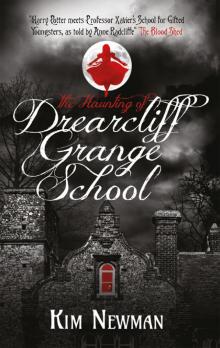 The Haunting of Drearcliff Grange School
The Haunting of Drearcliff Grange School The Other Side of Midnight
The Other Side of Midnight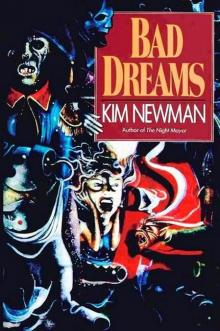 Bad Dreams
Bad Dreams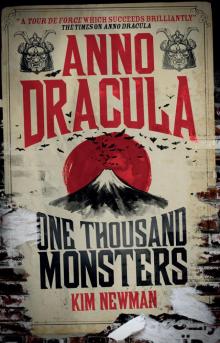 Anno Dracula--One Thousand Monsters
Anno Dracula--One Thousand Monsters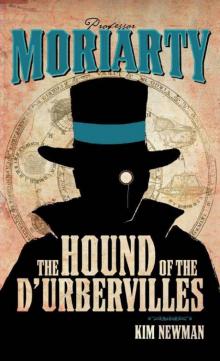 The Hound Of The D’urbervilles
The Hound Of The D’urbervilles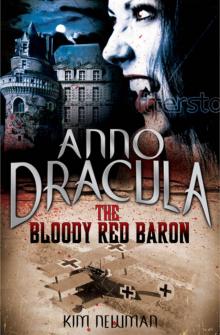 The Bloody Red Baron: Anno Dracula 1918
The Bloody Red Baron: Anno Dracula 1918